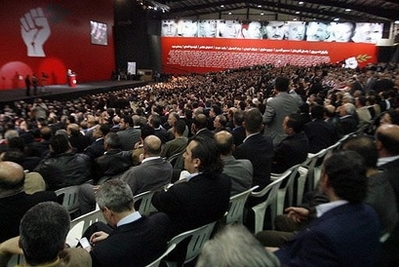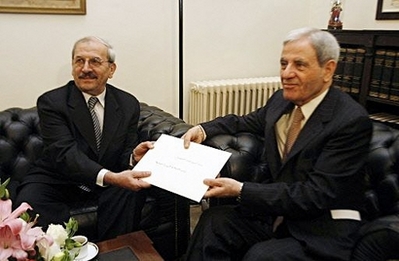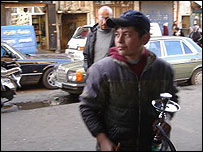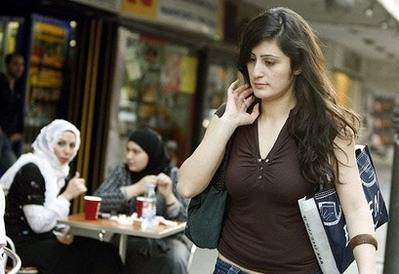 Beirut - Lebanon's anti-Syrian ruling "March 14 Forces coalition" started Friday its first official convention with the aim of declaring a comprehensive political platform for the country. The convention also marks the third anniversary of a massive demonstration often credited with stoking the international pressure that brought an end to Syria's 29-year military presence in Lebanon following the assassination of former premier Rafik Hariri in 2005.
Beirut - Lebanon's anti-Syrian ruling "March 14 Forces coalition" started Friday its first official convention with the aim of declaring a comprehensive political platform for the country. The convention also marks the third anniversary of a massive demonstration often credited with stoking the international pressure that brought an end to Syria's 29-year military presence in Lebanon following the assassination of former premier Rafik Hariri in 2005.
The grouping's secretary, former MP Fares Soueid, said the coalition would extend its hand to all other parties in Lebanon in a bid to overcome differences and unify national ranks. Speaking on behalf of the ruling coalition's different parties, Soueid announced the March 14 Forces' first "political declaration." "Together for the salvation of Lebanon, together for defending our right to live, together for living peacefully in a sovereign, democratic, and modern state," read the declaration's opening lines. The declaration focused on four major points; national unity as a precondition to true independence, protecting state sovereignty through restructuring state institutions and restricting the possession of arms to the state exclusively, protecting independence through redefining the concept of resistance in a way that conforms with national criteria, and safeguarding independence by restructuring Lebanon's role and relations in the Arab world. Soueid stressed that national unity could only be achieved by creating a civil state that develops the idea of true citizenship at the expense of clientalism and sectarianism. Soueid said Lebanon's sovereignty could not be protected without restricting the possession of arms to the state. Damascus must stop treating Lebanon as if it is a district of Syria," Fares Suaid, a key coalition figure, told around 2,500 people at a conference in Beirut to mark the anniversary.
According to organizers, the convention entitled "Spring of 2008" will try to define the coalition's political objectives, a feature that has been largely absent from Lebanese politics - both before and after the Syrian withdrawal. The March 14 coalition came into existence in the wake of the assassination of Hariri, who was killed in a massive bomb blast at a seafront area of Beirut along with 20 other people on February 14, 2005.
Some cabinet ministers criticized Damascus for not following standard protocol in extending the invitation and said Lebanon should boycott the meet because of Syria's role in the country's protracted presidential crisis. The invititation was submitted by Syria's Deputy Foreign Minister Ahmed Arnous to Lebanese Foreign Minister Fawzi Salloukh. "I have received an invitation from Syrian premier Mohammad Naji Otri's envoy for Prime Minister Fuad Siniora to attend the 20th Arab summit," said Salloukh, one of six opposition ministers who resigned from the government in November 2006 but who has nonetheless still been fulfilling some of his official duties. "My ministry will submit the invitation to the prime minister when he returns from the Organisation of the Islamic Conference summit being held in Dakar " he added. The Syrian foreign ministry issued a statement quoting Arnous as saying that it would be up to Lebanon to determine at what level it will be represented at the summit. "Due to the presidential void, Lebanon will choose the person who will represent it at the summit and Syria will receive them cordially," the statement quote Arnous as saying.The Arab summit is scheduled for March 29-30 in Damascus. It has been mired in controversy over Lebanon's participation and the presidential crisis it is facing because of a standoff between the opposition, backed by Syria and Iran, and the majority backed by the West and many Arab states. by Khalil Fleyhan, BEIRUT (AFP) - Syria on Thursday officially invited Lebanon to the Arab summit, a move seen as a bid to ease tensions with Arab countries who had hinted they might boycott the meeting should Beirut be excluded. The Syrian invitation was addressed to Prime Minister Fuad Siniora, but there were doubts on whether he would accept.
by Khalil Fleyhan, BEIRUT (AFP) - Syria on Thursday officially invited Lebanon to the Arab summit, a move seen as a bid to ease tensions with Arab countries who had hinted they might boycott the meeting should Beirut be excluded. The Syrian invitation was addressed to Prime Minister Fuad Siniora, but there were doubts on whether he would accept.
Necessity: Mahmoud, 14, lives in a world of machines, tools and dirt and spends his days cutting wood and making furniture. He tells me he last went to school three years ago. Studying is no longer an option. His family needs the money, so he puts in 12-hour shifts for couple of dollars a day. Lebanon signed an international convention in 2001 which included a series of measures to curb the worst forms of child labour. But - due to total political deadlock here - nothing has been implemented. The children don't complain about their situation. For many, school was just a brief interlude before the real business of life began. Some say they are still ambitious to become doctors, lawyers or bankers. Few seem to realise those avenues are probably already closed.  By Mike Sergeant, Their faces are covered in dirt. Their hands are tough and grimy. Their eyes have been hardened by years of adult labour. Lebanon's child workers lost their playfulness a long time ago. According to some estimates, up to 100,000 children - some as young as eight years old - work in Lebanon. The problem is getting worse because of the long-running political crisis in the country, and growing economic uncertainty here. Stroll down some of the inner city streets in Tripoli and you can see young boys sawing, painting, hammering and welding. During what should be school time, there are children hard at work in almost every workshop, garage and cafe.
By Mike Sergeant, Their faces are covered in dirt. Their hands are tough and grimy. Their eyes have been hardened by years of adult labour. Lebanon's child workers lost their playfulness a long time ago. According to some estimates, up to 100,000 children - some as young as eight years old - work in Lebanon. The problem is getting worse because of the long-running political crisis in the country, and growing economic uncertainty here. Stroll down some of the inner city streets in Tripoli and you can see young boys sawing, painting, hammering and welding. During what should be school time, there are children hard at work in almost every workshop, garage and cafe.
 by Rana Moussaoui, BEIRUT (AFP) - Lebanese women may be known as the Arab world's most liberal but they are by no means the region's most liberated considering antiquated laws that reduce them to second-class citizens. "The law in this country still considers a woman as being inferior," complained sociologist Rafif Sidaoui. From domestic violence to rape to adultery, the rights of women often fall by the wayside in this multi-confessional sectarian society, nonetheless deemed avant-garde in the mostly conservative Middle East. "One of the absurd laws on the books allows a rapist to be exempt from prison if he marries his victim," said Ezzat Mroue, vice-president of the Women's Rights Committee (WRC). "A few years ago, there was a major scandal when a young man, who was after his cousin, kidnapped her from her university," she added. "He raped her and then brought her before a sheikh who married them. "The result was that he was not guilty in the eyes of the law," Mroue said.
by Rana Moussaoui, BEIRUT (AFP) - Lebanese women may be known as the Arab world's most liberal but they are by no means the region's most liberated considering antiquated laws that reduce them to second-class citizens. "The law in this country still considers a woman as being inferior," complained sociologist Rafif Sidaoui. From domestic violence to rape to adultery, the rights of women often fall by the wayside in this multi-confessional sectarian society, nonetheless deemed avant-garde in the mostly conservative Middle East. "One of the absurd laws on the books allows a rapist to be exempt from prison if he marries his victim," said Ezzat Mroue, vice-president of the Women's Rights Committee (WRC). "A few years ago, there was a major scandal when a young man, who was after his cousin, kidnapped her from her university," she added. "He raped her and then brought her before a sheikh who married them. "The result was that he was not guilty in the eyes of the law," Mroue said.
And although so-called "honour crimes" are not widespread in Lebanon, as in some other Arab countries, every year a number of women are killed by male relatives under the pretext of defending the family honour.Under the law, the murderer can benefit from "mitigating circumstances". But "murder is murder and you cannot apply different penalties" depending on gender, insisted Mroue. She said when it comes to adultery, the picture is not brighter. A woman can be sentenced to two years in prison if a third party accuses her of cheating on her husband, whereas a man has to be caught red-handed before being hauled to court.
Khazen History


Historical Feature:
Churches and Monasteries of the Khazen family

St. Anthony of Padua Church in Ballouneh
Mar Abda Church in Bakaatit Kanaan
Saint Michael Church in Bkaatouta
Saint Therese Church in Qolayaat
Saint Simeon Stylites (مار سمعان العامودي) Church In Ajaltoun
Virgin Mary Church (سيدة المعونات) in Sheilé
Assumption of Mary Church in Ballouneh
1 - The sword of the Maronite Prince
2 - LES KHAZEN CONSULS DE FRANCE
3 - LES MARONITES & LES KHAZEN
4 - LES MAAN & LES KHAZEN
5 - ORIGINE DE LA FAMILLE
Population Movements to Keserwan - The Khazens and The Maans
ما جاء عن الثورة في المقاطعة الكسروانية
ثورة أهالي كسروان على المشايخ الخوازنة وأسبابها
Origins of the "Prince of Maronite" Title
Growing diversity: the Khazin sheiks and the clergy in the first decades of the 18th century
Historical Members:
Barbar Beik El Khazen [English]
Patriach Toubia Kaiss El Khazen(Biography & Life Part1 Part2) (Arabic)
Patriach Youssef Dargham El Khazen (Cont'd)
Cheikh Bishara Jafal El Khazen
Patriarch Youssef Raji El Khazen
The Martyrs Cheikh Philippe & Cheikh Farid El Khazen
Cheikh Nawfal El Khazen (Consul De France)
Cheikh Hossun El Khazen (Consul De France)
Cheikh Abou-Nawfal El Khazen (Consul De France)
Cheikh Francis Abee Nader & his son Yousef
Cheikh Abou-Kanso El Khazen (Consul De France)
Cheikh Abou Nader El Khazen
Cheikh Chafic El Khazen
Cheikh Keserwan El Khazen
Cheikh Serhal El Khazen [English]
Cheikh Rafiq El Khazen [English]
Cheikh Hanna El Khazen
Cheikha Arzi El Khazen
Marie El Khazen